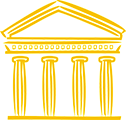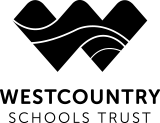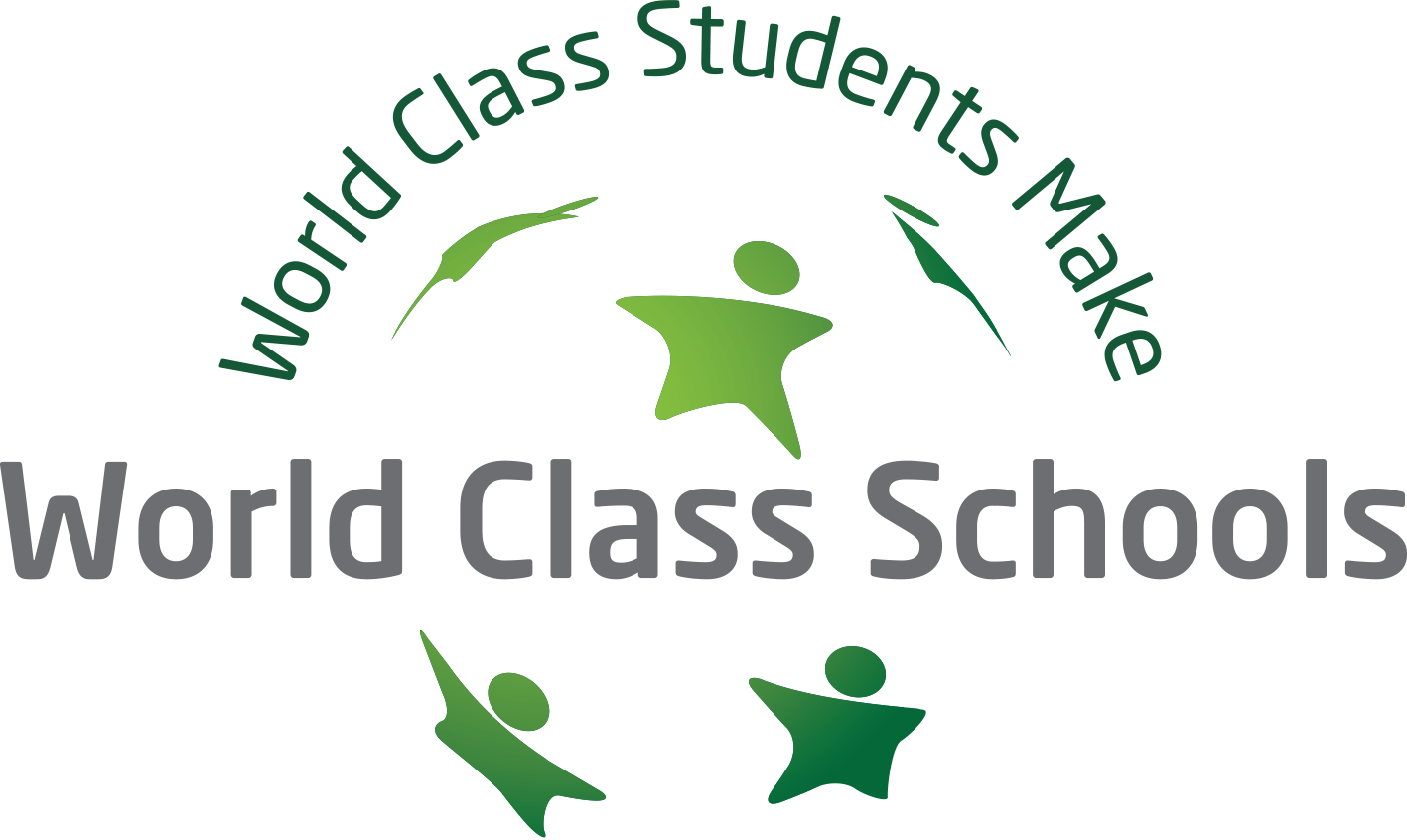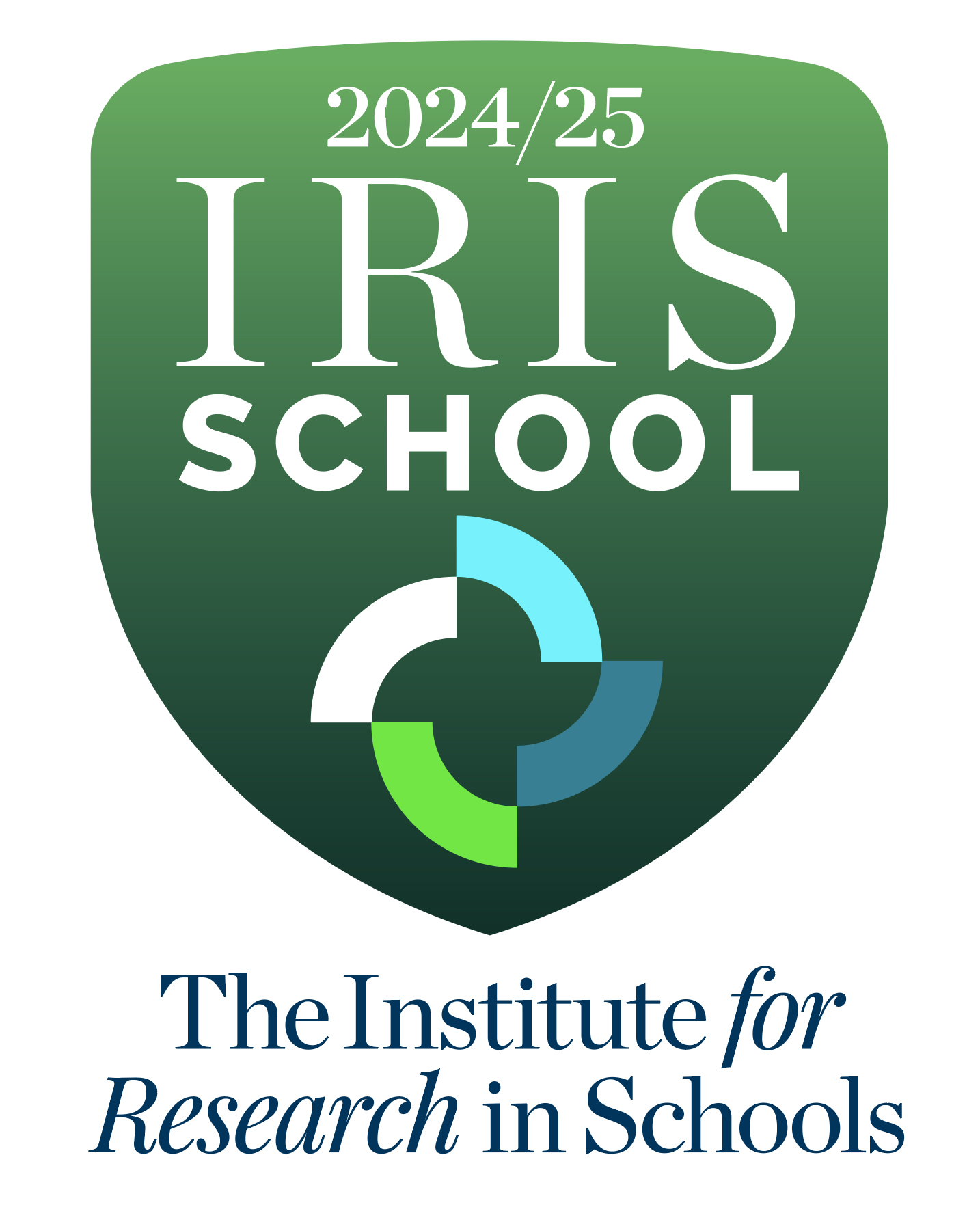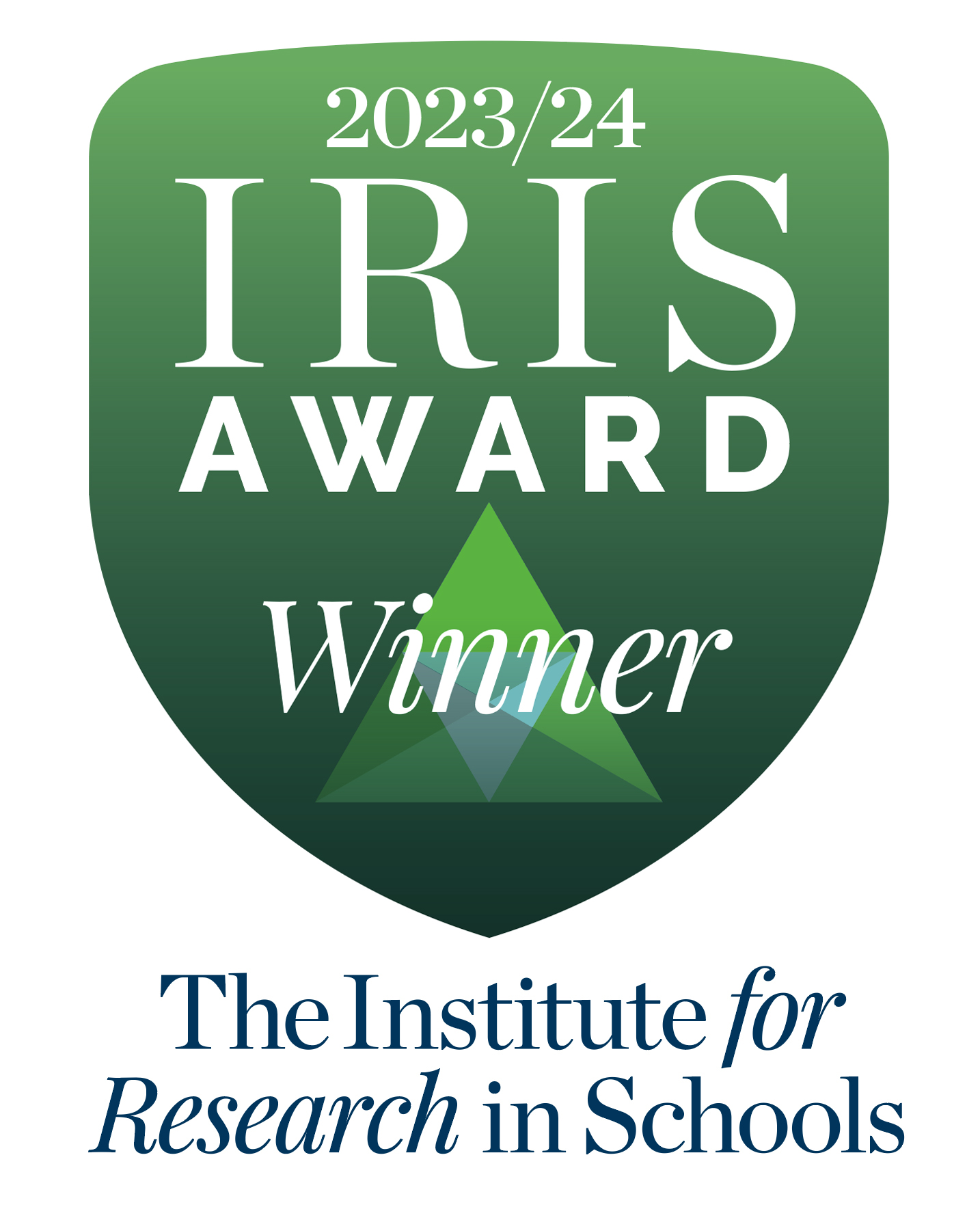Curriculum
Curriculum Statement
It is our intent that students at Hele’s School enjoy their learning. They follow a curriculum which is firmly rooted in our belief that students need knowledge to be successful and need qualifications to progress into the world of work. Alongside qualifications, we recognise that skills such as communication, leadership and teamwork are essential, and our curriculum offers many opportunities for students in these areas. Principles of cognition and memory for learning are embedded into our curriculum, as are structures to support cooperative learning. This is a key development in our strategy to ensure that students are partners in learning.
We are committed to the development of the whole child and pay high regard to the social and emotional aspects of learning; we want all young people to feel safe, to feel valued, to have confidence and pride in their abilities. Our curriculum enables every individual to shine and contribute positively to our school and the community.
We celebrate success, aspiration, challenge and inclusion, and are passionate and relentless in our drive for excellence, thus ensuring that all learners are supported into meaningful adult lives.
If you would like to find out more about our curriculum, please contact Mrs Andrea Ayres (Assistant Principal).
Cultural Capital
When we talk about building our students’ cultural capital we mean that our curriculum gives them knowledge so that they can make links between their learning, and acquire more knowledge as a result. We teach students to apply this knowledge thus developing the skills to be successful in life. We expose students to the best that has been thought, said and done from each subject canon. We enrich their learning through extracurricular offers across the key stages in a wide range of subject areas and offer leadership opportunities beyond the taught curriculum. Our curriculum includes high quality PSHE lessons which ensure students feel valued, build their confidence and have aspiration through CIAG and exposure to employers and alumni who serve as role models in and beyond our community. Through this delivery we give our students power to help them achieve goals and become successful, and the desire to aspire and achieve social mobility whatever their starting point.
Curriculum Description
In line with all secondary schools across WeST, Hele’s School curriculum is organised around 50 1-hour lessons per fortnight, the timetable being delivered as Week A & Week B. Below is an overview of subjects and their allocation as offered at each Key Stage:
| Key Stage | Age | |
|---|---|---|
| 3 | Years 7-8 | English (7), Maths (7), Science (7), MFL (5), Geography (4), History (4), RS (2), Art (2), Computing (1), Drama (2), Music (2), Personal Development (1), PE (4), Technology (2) |
| 3 | Year 9 | English (8), Maths (8), Science (8), MFL (5), Geography (4), History (4), RS (2), Art (2), Computing (1), Drama (1), Music (1), Personal Development (1), PE (3), Technology (2) |
| 4 | Years 10-11 |
Core Curriculum: English Lang & Lit (8), Maths (8), Combined Science (9), Philosophy & Ethics (1) Personal, Social and Health Education (1), PE (3)
|
| 5 | Years 12-13 | A range of AS/A Level/BTEC courses (9) alongside GCSE English/Maths if required (4) or an Extended Project Qualification (2) |
Students with a disability participate fully in the school’s curriculum in line with our accessibility plan. Students who need any modifications made for their own particular needs are supported by teachers across the school to take a full options package, to best suit them. A small number of individuals may be on a bespoke temporary timetable to include some specialist provision as part of our pastoral support programme.
Students who were in Y9 in September 2022* have started on the first year of a three-year long Key Stage 4. This is designed to give students access to a more challenging and engaging curriculum through increased opportunities to master their chosen subjects, to experience learning outside of the classroom and consequently to achieve even greater success at GCSE level.
Alongside other secondary schools in the Westcountry School Trust, we have been developing our curriculum over the last few years, drawing on evidence from cognitive science and how we learn. Consequently, we are placing much more emphasis on the sequencing of core knowledge and retention of key information, with the understanding that the more we know, the more we can learn. We want our students to know as much as possible about as many different aspects of our world as possible.
As a result, all Westcountry Schools Trust Secondary Schools have agreed to follow a common curriculum structure of a three-year Key Stage 3 from September 2023.
Key Stage 3
Our Key Stage 3 curriculum is designed to be ambitious, broad and balanced; all students study the traditional mix of academic subjects as well as the full range of arts subjects, design and food technology and a range of activities through PE. The curriculum is planned and sequenced so that all students have the knowledge and cultural capital they need to be successful at KS4. Teachers plan lessons to encourage participation and cooperation between students, and the curriculum prepares students over 3 years with the knowledge and skills necessary to move into more in-depth study from Year 10, when students begin the journey towards their GCSE courses.
We are committed to delivering all subjects on the National Curriculum, and give time to each individual subject over the 3 year Key Stage, allowing students to make informed choices about those subjects they wish to pursue and develop a deeper understanding of as they move into Year 10. We achieve a balance between setting by ability and mixed ability delivery so as to ensure students have a well-rounded experience yet are challenged and supported in equal measure.
In Year 7 each Tutor group is a mixed ability group. MFL, Personal Social and Health Education, Music, Art, Drama and Computing are taught in these groups in Y7, whilst Humanities and Science are taught in different mixed ability classes for all groups in Year 7. The English Department teach in mixed ability classes, except for one nurture group made up of students with specific literacy needs, based on Key Stage 2 SATs, Teacher Assessments and NGRT ( Reading Tests completed on entry to Hele’s). Students still access the taught English curriculum and may move in and out of this support group in light of internal assessment data if appropriate. Where necessary students may also receive additional literacy support through the Lexia intervention programme at any point in the year.
Maths lessons in year 7 are organised into 3 streams by prior attainment in maths, which we believe provides the best opportunities for appropriate stretch, challenge and support and hence maximises progress in maths. Opportunities for set changes occur throughout the year & are informed by internal assessment data and discussions between Heads of Departments, students and parents as appropriate.
Students are taught where possible in single-sex groups in PE, and in smaller mixed groups for Technology, although these groups need to be much smaller than a Tutor group (no more than 24 students in a Technology group) to safeguard students in practical delivery.
Students who joined Hele’s in September 2024 are taught either French , German or Spanish as a first foreign language to Year 7, known as the ‘core’ language. This is decided upon entry; 4 Tutor groups take French 2 take German and 2 take Spanish. All students take a Modern Foreign Language as part of their core curriculum throughout Key Stage 3.
This model is followed through into Years 8, without the additional nurture class in English. In Year 8 and Year 9 we have 4 classes in each year group learning French and 4 learning German.
Key Stage 4
Hele’s School has an ambitious, traditional and rigorous Key Stage 4 curriculum which prepares our students well for the next stage of their education, whether advanced level study or apprenticeships. We are committed to providing a strong academic core for all of our young people, and the majority of our students study the full EBacc suite of subjects to GCSE level. The curriculum is planned and designed to give all learners, particularly the most disadvantaged and those with special educational needs and/or disabilities (SEND) or high needs, the knowledge and cultural capital they need to succeed in life. As well as a comprehensive offer of optional GCSE subjects, we offer a small number of BTEC, ASDAN and Cambridge National Awards at Level 1 or 2 for those students better suited to practical assessment.
Alongside other secondary schools in the Westcountry School Trust, we have been developing our curriculum over the last few years, drawing on evidence from cognitive science and how we learn. Consequently, we are placing much more emphasis on the sequencing of core knowledge and retention of key information, with the understanding that the more we know, the more we can learn. We want our students to know as much as possible about as many different aspects of our world as possible. As a result, all Westcountry Schools Trust Secondary Schools have agreed to follow a common curriculum structure of a two-year Key Stage 4.
By maintaining 4 options alongside a rigorous core curriculum for all, students study a diverse range of subjects at GCSE level.
All students in 10 and Year 11 study English (English Language and English Literature), Maths, Science (Trilogy), Active Leisure (non-examined PE, with an emphasis on healthy lifestyles), Religious Studies and Personal, Social and Health Education (PSHE). In addition to this core curriculum, students take 4 additional subjects; for the majority of the cohort, this includes French or German to GCSE level. A small cohort of students are identified as requiring additional support in core subjects and follow additional lessons in maths and English. These students are still able to access 3 full GCSE option subjects, ensuring that they have a blended learning experience of vocational & academic opportunities more than ever before.
A programme of Citizenship, Personal Wellbeing, British Values, Health Education (including drugs, sex and sexual health), Economic Wellbeing and Careers is delivered through timetabled Religious Studies and PSHE lessons.
KS4 students follow 4 courses to GCSE (Level 2) from the following list:
Art; Business Studies; Computing; Design and Technology; Drama; Geography; History ; French; German; Hospitality ; ICT (Creative iMedia) ; Latin; Music ; Physical Education; Religious Studies; Spanish; Travel and Tourism.
In addition to this offer, able mathematicians are offered a L2 qualification in Additional Maths in twilight time.
Core subjects, English, Maths, Science and MFL are blocked. Classes in Science and MFL are set by ability in the subject across half year populations, whilst Maths is set across the whole year group. This supports the demands of tiered entry at GCSE for Maths, Science and MFL. English and all other GCSE / Level 2 subjects are taught in mixed ability classes to ensure a blend of experience, and to maximise subject choice for all.
Key Stage 5
Our Sixth Form is ambitious and provides challenge for all students. We welcome most of our Year 11 learners on into our Sixth Form and attract additional applications from students across the city at this stage of their education. Our courses are planned with the assumption that students will be going on to study at university. Whilst this is not the case for all students this leads to highest expectations and explicit delivery of subject knowledge.
A wide range of courses are available in the Sixth Form Centre. The majority are A level subjects, with a few A level equivalent courses, such as a BTEC in Applied Science, running alongside these. All courses are equivalent in size to one A level, are taught over two years and receive 9 hours of direct tuition from a subject specialist per fortnight. 1 hour a fortnight is timetabled as Independent Study which is to support wider reading & research around the subject by the students. Students therefore are all engaged in a programme of study exceeding 150 hours. Subjects are divided into 5 teaching blocks, and students may only choose one subject from each block. Most students are encouraged to make 3 choices, with a 4th subject offered to the most able students if appropriate. Some students will be guided towards the Extended Project at Level 3 or Work Experience to supplement and complement their studies.
A number of subjects are also provided on a consortium level, with a minority of students travelling to another local school in the Plym Consortium to access a course. This collaboration not only provides consortium solutions to resolve potential clashes for young people, but it also allows sharing of staff/resources/expertise to maximise efficiency, as well as the prospect of offering a broader range of courses and opportunities for Plym learners with appropriate, localised progression pathways.
All students aged 16 to 19 studying 150 hours or more, who do not hold at least a GCSE grade 4, are required to study English and maths as part of their study programme in each academic year ; for these students they will be working towards GCSE English or Maths, and their timetable is shaped to suit their individual requirements. Students are encouraged and supported to gain work experience for one day a week if their timetable allows for this.
All students follow a programme of personal development activities through a pastoral programme, delivered by tutors. Work Experience is an integral part of the Post 16 curriculum, with all students supported to find a placement during the whole school Enrichment Week at the end of year 12. The CIAG programme ensures that all students are encouraged to consider higher education, apprenticeship routes and employment as valid progression routes, and supported in making appropriate decisions around next steps.
Extended Curriculum
There is a broad range of extra-curricular activities offered to youngsters of all ages, abilities and aptitudes. Many of these are subject-specific (PE clubs; Animal Club; Street Dance, etc) although there are also cross-curricular and leadership programmes to engage learners on a more spiritual or social level (Christianity Club; Mindfulness; Duke of Edinburgh; CCF; Sports Leaders; Language Leaders; Literacy Leaders, etc)
Our annual ‘Aspiration Week’ is an action-packed enrichment week for Years 7-9, whilst Year 10 and Year 12 are on work experience. During this week, the normal school timetable is suspended & replaced by an extensive menu of activities to suit all interests, giving all young people the chance to try new things or improve their skills & knowledge in hobbies or interests outside school, & to work with other young people across the age range. There are opportunities for residential experiences, sports, outdoor & adventure activities, creative and arts-based activities, science, technology and nature experiences, and of course, this gives opportunities to improve or to try new hobbies and interests.
Work Experience remains an integral part of our curriculum guarantee to young people, despite the withdrawal of the statutory entitlement to Work Experience at KS4. All Year 10 learners have an opportunity to undertake a week of Work Experience with local employers during Aspiration Week. Post-16 students are actively encouraged and supported to undertake Work Experience throughout this week also. Those Year 10s not engaging in Work Experience follow an in-house programme around ‘Preparation for Working Life’ instead. Delivered in partnership with Training Providers, local Employers & Colleges, this programme has its emphasis on employability skills, CEIAG & First Aid
Curriculum Pathways
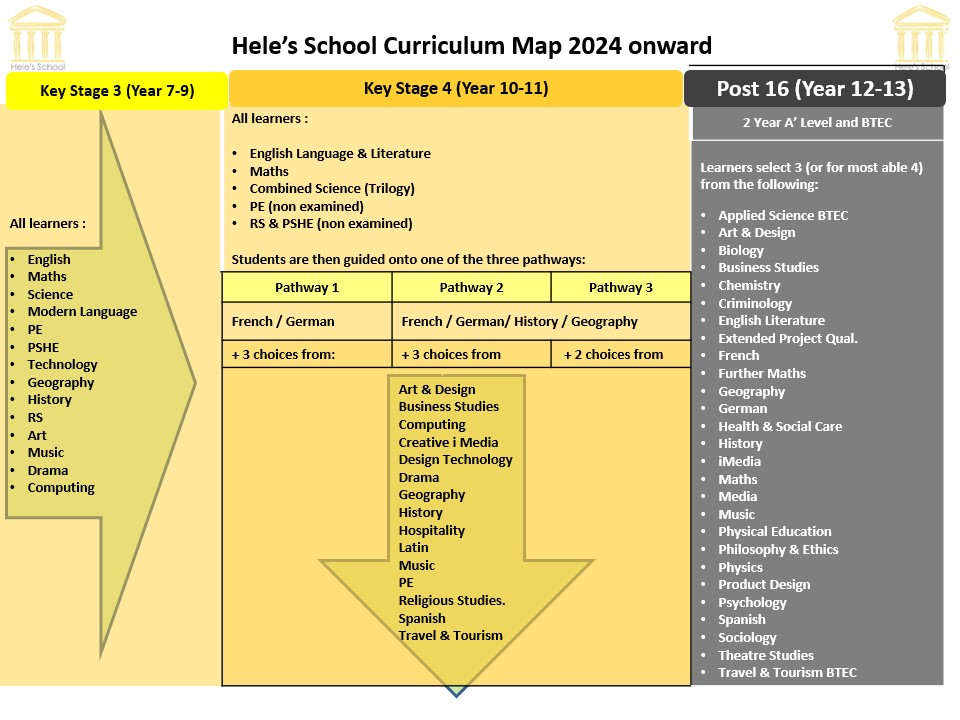
Homework
Our belief
| KS3 | KS4 | KS5 | |
|
Maths
|
1 hour Sparx online every week; self-marking compulsory tasks plus additional Target/ XP Boost as necessary to make up to 60 mins
|
1 hour Sparx online every week; self-marking compulsory tasks plus additional work from Revision/ Independent Learning/ Fix-up sections as necessary to make up to 60 mins as minimum
|
All subjects should be setting up to 10 hours of homework/ wider reading a fortnight
|
|
English
|
Knowledge Quiz and Reading Quiz every week
|
Knowledge Quiz and Exam Practice (application of knowledge) every week
|
|
|
Science
|
30 minutes a week. Online knowledge retrieval via Educake
|
90 minutes a week ( 30 mins on each of Biology, Chemistry and Physics). Online knowledge retrieval via Educake
|
|
|
Other subjects
|
Up to 30 mins a week
|
Up to an hour a week
|

